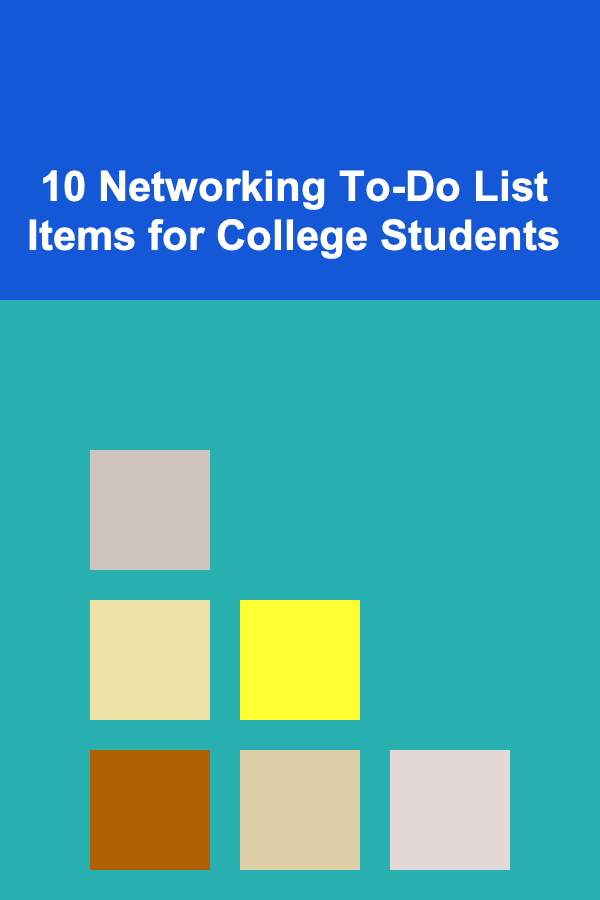
10 Networking To-Do List Items for College Students
ebook include PDF & Audio bundle (Micro Guide)
$12.99$5.99
Limited Time Offer! Order within the next:

Networking is one of the most valuable skills you can develop during your time in college. Building a strong network can open doors to countless opportunities, whether you're seeking internships, jobs, mentorship, or simply expanding your knowledge in your field of study. However, many college students may not fully realize the power of networking or know where to start. To help you on your journey, we've put together a list of 10 key networking to-do items for college students.
Attend Campus Networking Events
Many colleges and universities host networking events that allow students to meet professionals, alumni, and potential employers. These events can range from job fairs to specialized career nights or industry-specific mixers. Attending these events provides you with an excellent opportunity to expand your professional circle, learn about career paths, and gather insights from experienced professionals.
- Action Item: Keep track of campus events, career fairs, or industry meetups and make it a point to attend them regularly.
- Tip: Prepare an elevator pitch about yourself, including your academic background, career interests, and skills.
Join Student Organizations or Clubs
Student organizations and clubs often have networking opportunities within specific industries, such as finance clubs, engineering societies, or marketing groups. Being an active member allows you to meet peers who share similar interests and connect with faculty, industry professionals, and alumni. Additionally, student organizations often host events, workshops, and guest speakers, which provide opportunities to learn and expand your network.
- Action Item: Find and join at least one organization or club that aligns with your major or career interests.
- Tip: Take on leadership roles within the organization to build relationships and demonstrate initiative.
Utilize Social Media Platforms
In today's digital age, social media platforms such as LinkedIn, Twitter, and even Instagram can serve as powerful tools for networking. LinkedIn, in particular, is designed for professional connections. It allows you to create an online resume, showcase your achievements, and connect with professionals in your field. By engaging with industry leaders, professors, and alumni on these platforms, you can broaden your network and keep up to date with industry trends.
- Action Item: Create or update your LinkedIn profile with relevant experiences, courses, and skills.
- Tip: Follow key individuals or organizations in your industry and engage with their posts by commenting or sharing valuable insights.
Reach Out to Professors and Mentors
Your professors are one of your best resources for networking. Not only do they have vast knowledge in their fields, but they also have connections with professionals, organizations, and alumni. Cultivating relationships with your professors can lead to valuable advice, internships, and even job recommendations.
- Action Item: Make an effort to meet with your professors during office hours, ask thoughtful questions, and stay engaged in class.
- Tip: If you find a particular professor's research or work interesting, express your enthusiasm and ask if you can assist with their research projects.
Participate in Internships and Volunteer Opportunities
Internships are perhaps the most practical way to build a professional network while gaining real-world experience. Not only do internships provide you with valuable skills, but they also expose you to industry professionals who can become lifelong contacts. If internships are not readily available, consider volunteer opportunities that are related to your field of interest.
- Action Item: Apply for internships or volunteer positions that align with your career goals.
- Tip: During your internship, make an effort to connect with your colleagues, supervisors, and others in the organization.
Conduct Informational Interviews
Informational interviews are a great way to learn more about a specific industry, company, or role. Reaching out to professionals for an informational interview gives you a chance to ask questions about their career paths, challenges, and successes. While these conversations are not job interviews, they can lead to valuable insights and connections that may help you in the future.
- Action Item: Reach out to professionals you admire for informational interviews (via email or LinkedIn).
- Tip: Prepare questions that will help you gain insights into the industry and the professional's career journey, such as "What advice would you give someone starting in this field?"
Attend Conferences and Seminars
Conferences and seminars, whether virtual or in-person, are excellent opportunities to meet industry leaders, potential employers, and like-minded peers. These events often feature presentations, panel discussions, and networking sessions that allow you to interact with professionals who share your interests.
- Action Item: Look for conferences or seminars related to your field of study and plan to attend.
- Tip: Take the opportunity to introduce yourself to speakers or attendees and exchange contact information.
Leverage Alumni Networks
Many colleges and universities have alumni networks that connect current students with graduates. Alumni can offer valuable advice, mentorship, and job opportunities. Additionally, they understand the challenges and experiences of being a student at your institution, so they are often willing to help and provide guidance.
- Action Item: Reach out to your school's alumni network or use LinkedIn to connect with alumni.
- Tip: Be specific when reaching out to alumni by mentioning shared experiences, such as your major or extracurricular involvement.
Develop Soft Skills and Personal Branding
While technical skills are essential, soft skills such as communication, empathy, and collaboration are equally important. Networking is not just about exchanging business cards; it's about building meaningful relationships. Building a personal brand---who you are, what you stand for, and how you present yourself---can help you leave a lasting impression.
- Action Item: Work on enhancing your communication and interpersonal skills.
- Tip: Practice active listening and be genuinely interested in the people you meet.
Follow Up and Stay Engaged
After meeting someone through an event, internship, or networking opportunity, be sure to follow up. Sending a brief thank-you email or message on LinkedIn can show your appreciation and help you stay on their radar. Additionally, keeping in touch over time, such as sending periodic updates or sharing relevant articles, can help maintain the connection and build a long-term relationship.
- Action Item: Send a thank-you message or email after meeting someone new.
- Tip: Keep the conversation going by checking in periodically or sharing relevant information.
Conclusion
Networking is not a one-time activity; it's an ongoing process of building meaningful relationships that will support your career growth and personal development. By being proactive, utilizing available resources, and following these networking tips, you can set yourself up for success both during college and in your future career. Remember, the more effort you put into networking now, the more doors it will open for you down the road.
Reading More From Our Other Websites
- [Paragliding Tip 101] The Runway Approach: How to Use Ground Speed and Wind to Land Safely
- [Home Staging 101] How to Stage Your Home for Buyers Looking for a Green Lifestyle
- [Personal Finance Management 101] How to Effectively Manage Student Loans and Avoid Debt Stress
- [Organization Tip 101] What Are Smart Strategies for Organizing Your Pantry?
- [Digital Decluttering Tip 101] Automation Hacks: How to Cut Manual Tasks in Half with Smart Tools
- [Home Family Activity 101] How to Cook Together: Simple Recipes for Family Cooking Nights
- [Home Storage Solution 101] How to Transform Your Garage with Smart Tool Organization for Every DIYer
- [Home Staging 101] How to Stage a Living Room: What Are the Key Strategies for a Functional and Stylish Space?
- [Organization Tip 101] How to Maximize Storage in Your Kitchen and Bathroom
- [Organization Tip 101] How to Create a Zen Space for Mindfulness and Clarity

How to Build a Safe and Comfortable Nursery for Your Baby
Read More
How to Prevent Package Theft at Your Front Door
Read More
How To Secure Your Data During Online Transactions
Read More
How To Negotiate a Remote Work Arrangement
Read More
Dealing with Workplace Stress and Burnout: A Comprehensive Guide
Read More
How to Start a Kids' Investment Club
Read MoreOther Products

How to Build a Safe and Comfortable Nursery for Your Baby
Read More
How to Prevent Package Theft at Your Front Door
Read More
How To Secure Your Data During Online Transactions
Read More
How To Negotiate a Remote Work Arrangement
Read More
Dealing with Workplace Stress and Burnout: A Comprehensive Guide
Read More